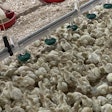Bacteria most frequently responsible for food-borne infections, such as Salmonella andCampylobacter, show significant resistance to common antimicrobials. Combined resistance, or co-resistance, to critically important antimicrobials remains low, and while this means treatment options for serious infections with these zoonotic bacteria are available in most cases, the fact that antimicrobial resistance was commonly detected is cause for concern.
The findings were published in the European Food Standards Authority-European Centre for Disease Prevention and Control European Summary Report on antimicrobial resistance in zoonotic and indicator bacteria from humans, animals and food in 2012. The report includes data submitted by 26 of the EU member states.
Salmonella
The joint report shows that clinical resistance in humans to commonly used antimicrobials in Salmonella spp isolates was frequently detected at EU level, with almost half of the isolates being resistant to at least one antimicrobial, and 28.9 percent of isolates being multidrug resistant.
Levels of clinical resistance and co-resistance in Salmonella spp isolates to critically important antimicrobials, however, were low.
Resistance in animals to commonly used antimicrobials in Salmonella spp isolates was frequently detected in the animal species monitored, especially in broilers, pigs and turkeys. Resistance to ciprofloxacin (a critically important antimicrobial), was frequently observed in broilers and turkeys. Co-resistance to the critically important antimicrobials, ciprofloxacin and cefatoxime, was either not detected or reported at very low levels in reporting member states.
Campylobacter
In Campylobacter spp isolates from human cases, clinical resistance to common antimicrobials was frequently detected. Very high proportions of isolates (47.4 percent EU average) were resistant to the critically important antimicrobial ciprofloxacin with increasing trends observed in several member states.
Microbiological resistance to commonly used antimicrobials in Campylobacter spp isolates was frequently detected in broilers. Co-resistance to critically important antimicrobials, ciprofloxacin and erythromycin, in C jejuni in broilers was either not detected or reported in low levels.
Escherichia coli
Microbiological resistance to commonly used antimicrobials in E. coli isolates was frequently reported in broilers and pigs. Co-resistance to critically important antimicrobials in these animal species was mostly not detected or recorded at very low levels among the reporting member states.
















